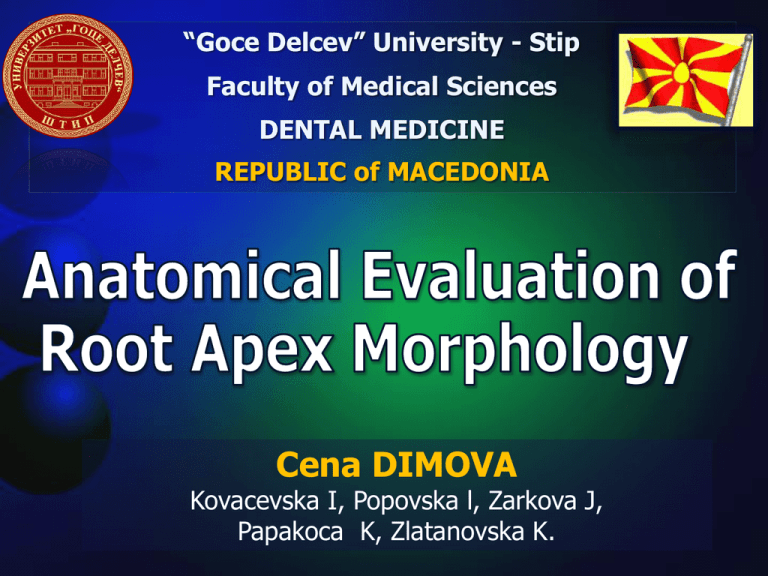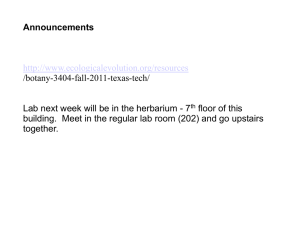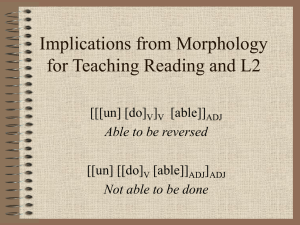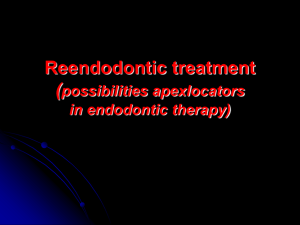Document
advertisement

“Goce Delcev” University - Stip Faculty of Medical Sciences DENTAL MEDICINE REPUBLIC of MACEDONIA Cena DIMOVA Kovacevska I, Popovska l, Zarkova J, Papakoca K, Zlatanovska K. Recognize your future www.ugd.edu.mk 2 Recognize your future www.ugd.edu.mk 3 Faculty of Medical Sciences Faculty of medical sciences 4 INTRODUCTION Evidence of Root Apex Morphology INVESTIGATION – Anatomical Evaluation of Root Apex Morphology INTRODUCTION Knowledge of the root canal system anatomy is a key factor in the success of endodontic therapy. The root apex requires special attention to foraminal location and establishment of the appropriate extension of instrumentation and filling. Great variation exists in root apex anatomy as well as in foramen position and location * introduction Potential clinical problems Clinical problems that can arise from endodontic practices are due to variations in the apexes of root canals, which are reflected in the various dentistry specialities, with anatomic and physiological knowledge being fundamental so as to the carrying out of a diagnosis and planning of the adequate treatment. *Sayão Maia et al. Study of foramen openings and their concurrence with root apexes. Revista Sul Brasileira de Odontolgia , 2005 (2) 1: 7-11. (ISSN 1806-7727) * introduction INTRODUCTION Evidence of Root Apex Morphology INVESTIGATION – Anatomical Evaluation of Root Apex Morphology Frequency of apical foramen deviation from tip of root apex *Martos et al. Anatomical Measurements of the Apical Root in Anterior and Posterior Teeth. J Endod 2010, (36) 4: 664-668 * evidence The position of apical constriction * Olson DG, Roberts S, Joyce AP, et al. Unevenness of the apical constriction in human maxillary central incisors. J Endod 2008;34:157–9. * evidence Distance between the apical foramen and the type of root apex *Althomani et al. The Anatomy of root apex. Saudi Endodontic Journal 2013, (3) 1: 1-9 * evidence INTRODUCTION Evidence of Root Apex Morphology INVESTIGATION – Anatomical Evaluation of Root Apex Morphology AIM The aim in our study was to determine: - the morphologic shape and - position of the root apex and - the major foramen in maxillary teeth. MATERIAL AND METHOD • A total of 120 maxillary human teeth were evaluated. • Central and lateral incisors, canines, premolars, and molars with completely formed apices were used. Laboratory of Dental Research snrlab@ugd.edu.mk http://www.ugd.edu.mk/snrlab/ Laboratory for electron microscopy and sem analyzis semlab@ugd.edu.mk http://www.ugd.edu.mk/semlab Each root specimen was measured at each root apex by using a calibrated microscope at magnification of 4.5X. The anatomic parameters evaluated were the shapes of peripheral contours of major apical foramen (rounded, oval, asymmetric, semilunar) and the root apex (rounded, flat, beveled, elliptical). The location was recorded and classified as center, buccal, lingual, mesial, or distal surface for both root apex and the major apical foramen. RESULTS MORPHOLOGY OF THE ROOT APEX TOOTH ROUNDED (%) FLAT (%) BEVELED (%) ELIPTICAL (%) N INCISORS 12 (35) 9 (25) 7 (20) 7 (20) 35 CANINES 8 (23) 7 (20) 5 (14) 15 (43) 35 PREMOLARS 11(45) 7 (27) 3 (12) 4 (16) 25 MOLARS 8 (32) 6 (24) 3 (12) 8 (32) 25 MORPHOLOGY OF THE MAJOR FORAMEN TOOTH ROUNDED (%) OVAL (%) ASIMETRIC (%) 6 (17) SEMILUNAR (%) 4 (11) N INCISORS 16 (46) 9 (26) CANINES 15 (43) 9 (25) 7(20) 5 (12) 35 PREMOLARS 11 (46) 8 (33) 3 (13) 2 (8) 25 MOLARS 17 (67) 5 (19) 2 (8) 1(6) 25 35 RESULTS LOCATION OF THE ROOT APEX CENTRALIZED (%) BUCCAL (%) LINGUAL (%) MESIAL (%) DISTAL (%) INCISORS 15 (43) 7 (20) 2 (7) 4 (10) 7 (20) CANINES 17 (48) 6 (18) 3 (8) 5 (14) 4 (12) PREMOLARS 13 (52) 2.5 (10) 1.5 (6) 2.5 (10) 5.5 (22) MOLARS 20 (81) 1 (5) 1 (5) 1 (5) 1 (5) TOOTH LOCATION OF THE MAJOR FORAMEN CENTRALIZED (%) BUCCAL (%) LINGUAL (%) MESIAL (%) DISTAL (%) INCISORS 11 (32) 8 (24) 3 (8) 4 (10) 9 (26) CANINES 15 (44) 3 (8) 1 (4) 3 (8) 13 (36) 10.5 (42) 3 (12) 2.5 (10) 1 (4) 8 (32) 10 (40) 2.5 (10) 1 (4) 1.5 (6) 10 (40) TOOTH PREMOLARS MOLARS CONCLUSION The predominant morphology of the root apex in incisors and premolars was the round shape. In canines and molars, the predominant configuration was the pointed shape. The morphology of the apical foramen showed a predominance of the rounded shape followed by the oval shape. The prevalent location of the root apex and the foramen was the central position followed by the distal position. Thank you for your atention ANY QUESTIUONS ?











